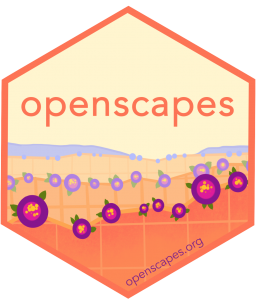The Challenge
Because of their traditional training and the structure of the labs, scientists tend to operate in their own silos. Most are self-taught coders who aren’t familiar with collaborative coding approaches and software tools. That can lead to inefficient data analysis. As scientists are increasingly asked to share the data and software with publication, many struggle to master data analysis and coding, which can bog down their projects and, ultimately, the discovery process.
The Solution
Julia Lowndes, a marine biologist at the National Center for Ecological Analysis and Synthesis at the University of California Santa Barbara, says her education was typical of many research domains and didn’t include formal instruction on data analysis. So she learned on her own – working as part of a small team of researchers. She found the power of coding collaboratively using the open-source programming language R and becoming part of the online R community made her feel included as a coder in a way she hadn’t experienced before. Workflows with R brought order to the chaos of repeating an annual and massive analysis of ocean health. Lowndes became a proponent of open through data analysis and began to envision a transformation in the way science could be conducted.
 In 2019, Lowndes started Openscapes, an organization that advocates for open practices in environmental science, and mentors research teams to help them develop open habits, starting with data analysis. She wanted to increase the visibility and use of open-source programming languages and expose other scientists to the value of working collaboratively in teams. Openscapes’ mission is to empower scientists and research groups to use existing open tools and connect with communities to uncover environmental solutions faster.
In 2019, Lowndes started Openscapes, an organization that advocates for open practices in environmental science, and mentors research teams to help them develop open habits, starting with data analysis. She wanted to increase the visibility and use of open-source programming languages and expose other scientists to the value of working collaboratively in teams. Openscapes’ mission is to empower scientists and research groups to use existing open tools and connect with communities to uncover environmental solutions faster.
The Impact
Openscapes uses resilient data practices for analysis as an entryway to meet scientists where they are. Resilient data practices means it’s easier for folks in the same lab to review each other’s code and help each other through similar challenges. It also provides resilience to the lab as a whole – so that their contributions of re-usable code, documentation, and shared practices persist when folks leave the lab, for example for a post-doc appointment.
Support for data analysis is one of the largest unmet needs for many researchers, and understanding researcher’s unmet needs provides a prime entryway to engage them in open science. (See more about barriers to integration of bioinformatics into undergraduate life sciences education in this PloSOne article.) Once the connection is made, they are able to develop new skills and a new mindset that often leads them to embracing open more broadly.
Lowndes says her open approach is promoting kindness and inclusion in the scientific community. “We aim to show that working with data and collaborating with each other can be a positive experience rather than demoralizing and stressful,” says Lowndes.
The mentorship program, Openscapes Champions, is cohort-based and helps scientists develop skills for collaborating remotely. It is designed for research teams to build community across research teams and universities. So far, Lowndes has mentored 13 PIs and their teams from academia and government to date; there is a waiting list to participate.
Through the Champions Program, the teams work together over several months to transform their data workflows to be open and collaborative to improve their science. By working openly in the cohort, using RStudio, GitHub and other tools, data analysis is no longer an individual burden but instead a collaborative effort. (See Nature column that Lowndes co-authored on tips for open science practices.) Researchers can learn and ask questions anchored in their immediate needs. This approach means students are able to participate in research more quickly and grant money is going further.
Also, teams are co-creating norms that promote diversity, equity and inclusion, according to Lowndes. Science has traditionally been dominated by white men and the aim is for this collaborative model to help accelerate the advance of researchers of women and people from underrepresented backgrounds.
“If you can do your analyses in a week rather than in five months, not only are you more likely to stay in science, but you are more likely to be productive in science,” says Lowndes. “The impact is that people feel included and that they belong. If open is trying to change science, a big part of that is making it a safer experience for people to participate in, and for it to be more equitable. Training in data analysis is an important part of this.”
Openscapes’ discussion-based mentorship nurtures trust on teams and makes data workflows more efficient. In addition to new skills, the approach means new habits are taking hold. Scientists are reorganizing files so they can be shared more easily, and thinking ahead so they can teach others when they join the research group.
“Data analysis is a sliver of open science. And something I learned as a Mozilla Fellow is that open science is a sliver of the open movement,” Lowndes. “This training and mentorship we provide helps researchers in their day-to-day lives by turning open into a daily benefit, but it also welcomes them into a whole other world of open to participate in.”
Openscapes has a lot of exciting plans for 2021 including the addition of Erin Robinson, Metadata Game Changers LLC to the team, as well as several Champions cohorts planned.
